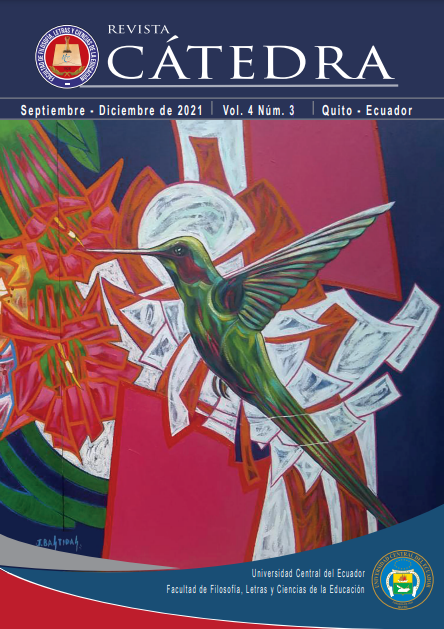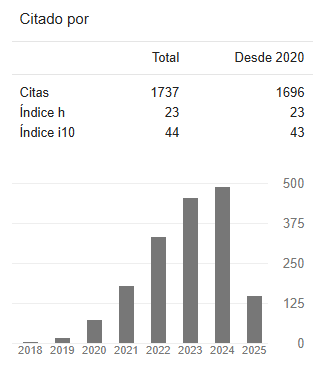The decline of the indigenous languages of Equatorial Guinea: a manifestation of the loss of cultural identity
DOI:
https://doi.org/10.29166/catedra.v4i3.3147Keywords:
native, culture, decadence, identity, languageAbstract
This study focuses on the analysis of the sociolinguistic situation in Equatorial Guinea. In this sense, it starts from the fact that the lack of learning of the country's native languages has led to a loss of cultural identity, which has been aggravated by other factors such as globalization. The little importance given to indigenous languages means that all of them are undergoing changes that would cause their decline and subsequent disappearance. Invest should be made in language policies that can counteract this effect because when a language disappears, so does a part of the same culture. It is important to note that this research is not anchored in linguistic relativism because it recognizes that promoting indigenous languages is not a way to veto the official languages of the country.
At present there is a loss of cultural identity motivated by the fact that children are not taught indigenous languages, they pretend that they are polyglot or bilingual without their own linguistic base: we refer to their indigenous languages that identify them as part of a group or community. Throughout this work, it becomes clear that there cannot be cultural policies without language policies, because people should know the indigenous languages of their culture. In fact, the main results of this research show the need to protect autochthonous languages, it is incoherent to promote Spanish to the detriment of autochthonous languages that represent the identity of each ethnic group.
Downloads
References
Araujo-Quiroz, C. B. (2013). “Bilingüismo: herramienta clave en el contexto universitario”. Revista Historia de la Educación Latinoamericana. Vol. 15 Nº, 20, pp. 189 - 204.
Habermas, J. (1987). Teoría de la acción comunicativa. Madrid: Taurus.
Flick, U. (2004). Introducción a la investigación cualitativa. Ediciones Morata y Fundación Paideia Galiza.
Fyle, C. (1983). La lengua, soporte de la identidad cultural. El correo de la Unesco, Año XXXVI, Unesco, París, 6-7.
Quilis, A., & Casado-Fresnillo, C. (1995). La lengua española en Guinea Ecuatorial. Madrid: UNED.
Álvarez-Feáns, A. Á. (2008). “Incluso estando callado puedes causar grandes problemas”. Revista Pueblos.
Piedra, L. (2010). Deixis personal y representaciones mentales: Propuesta de la existencia de los marcadores deícticos.cognitivos y su relación con la deixis personal (Tesis de maestría). Costa Rica: Universidad de Costa Rica.
De Saussure, F. (1945). Curso de lingüística general. Buenos Aires: Losada.
Alvar, M. (1982). La lengua como libertad y otros estudios. Madrid: Cultura Hispánica. Instituto de Cooperación Iberoamericana.
Giner, S. (1998). Diccionario de sociología. Madrid: Alianza.
Molano, O. (2008). Identidad cultural un concepto que evoluciona. Revista Ópera, (7), pp. 69-84.
Odio Zamora, G. (2001). Globalización, lengua universal y traductores. ACIMED; 9 (2), pp.136-41.
Sanguinetti, G. C. (2006). Hermenéutica y tropología en carta sobre el humanismo de Martin Heidegger. Revista de filosofía, 62, pp. 59-72.
Pérez, M., Perryman, A., González, N., González, L., & Abreu, M. (1999). Identidad nacional, organizaciones culturales y tiempo libre”. Centro de estudios sobre la juventud. La Habana. jóvenes en los noventa, pp. 251-279.
Lipski, J. (2004). The Spanish Language of Equatorial Guinea. Arizona Journal of Hispanic Cultural Studies, Volume 8, pp.116-119.
Teillier, F., Llanquina, G., & Salamanca, G. (2016). De qué hablamos cuando hablamos de etnolingüística: bases teórico-metodológicas para un trabajo con el mapunzugun. RLA. Revista de lingüística teórica y aplicada, 54 (2), pp.137-161.
Byram, M., & Fleming, M. (1998). Perspectivas interculturales en el aprendizaje deidiomas: enfoque a través del teatro y la etnografía. Madrid: Cambridge University Press.
Taylor, S. J., & Bogdan, R. (1994). Introducción a los métodos cualitativos de investigación. Barcelona: Paidós.
Pozzo, M. I., & Soloviev, K. (2011). CULTURAS Y LENGUAS: LA IMPRONTA CULTURAL EN LA INTERPRETACIÓN LINGÜÍSTICA. Tiempo de Educar, 12(24), 171-205.
Fernández, F. M. (1990). Metodología sociolingüística. Madrid: Gredos.
Villalobos Graillet, J. E. (2015). La globalización lingüística: el conflicto entre el inglés y el español. Glosas - Volumen 8, Número 7, 4-15.
Guiddens, A. (1991). Sociología. Madrid: Alianza Editorial.
Mounin, G. (1979). Diccionario de Lingüística . Barcelona: Labor.
UNESCO. (2003). Vitalidad y peligro de desaparición de las lenguas. Grupo especial de expertos sobre las lenguas en peligro convocado por la Unesco. Recuperado el 25 de Julio de 2021. Obtenido de http://www.unesco.org/new/fileadmin/MULTIMEDIA/HQ/CLT/pdf/LVE_Spanish_EDITED%20FOR%20PUBLICATION.pdf









